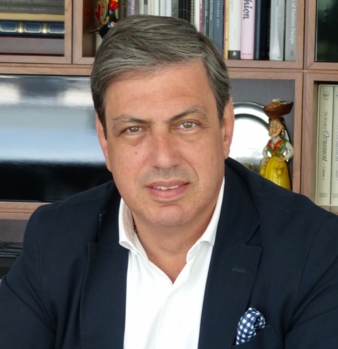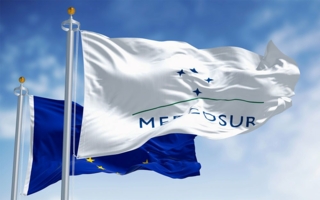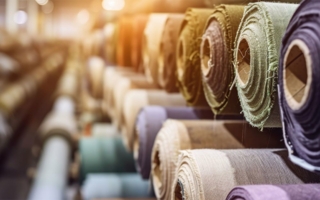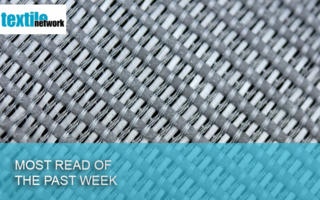11/07/2015 — auf Deutsch lesen
5 questions for Paulo Vaz
Portugal’s textile industry is re-inventing itself! 80 percent of production is destined for foreign markets, mainly Spain, France, Germany, the UK and the USA. Textile network spoke to Paulo Vaz, Director of Portugal’s Textile and Clothing Association (ATP).
Paulo Vaz: The Portuguese textile and clothing industry´s recovery depended to a great extent on the companies’ ability to adapt to change. They have been re-inventing themselves in the face of hardship and have been modernising to become more competitive. Some measures have, however, been taken centrally to help these transformations, such as an incentive to incorporate design and fashion, as well as to include technological innovations in products, but most of all the internationalisation programmes ATP has implemented over the years through Selectiva Moda. Selectiva Moda is the specialist organisation that takes 200 companies to participate in around 65 exhibitions in 35 countries every year. Our main goal was to consolidate our traditional markets, like Europe and the USA, but also to diversify to emerging markets like China, Angola, Brazil, Mexico, Colombia and Japan. With a reduced sector in terms of the number of companies and employees, we succeeded in increasing our exports by 23 percent to more than 4.6bn Euro from 2009 to 2014. The formula Portugal used to achieve its rightful position as a qualified force in the global fashion system was to produce with excellence and offer differentiated products with high added value.
Paulo Vaz: The Portuguese textile and clothing industry has a long tradition in men´s clothing, knitwear and home textiles. In the last few years, we have seen much progress in women´s clothing, which is fading out the specialisation seen in the past. Perhaps more interesting in this context is the arrival of a new subsector, which is becoming stronger and more relevant; by this I mean functional and technical textiles. A little less than a decade ago, technical textiles represented about 10 percent of all that the Portuguese industry produced. Nowadays, this percentage has risen to more than 20 percent of total textile and clothing production and exports. It is estimated that by the end of this decade, it might even reach 30 percent, catching up with the average of the main European leaders in this domain, like Germany.
Paulo Vaz: Portugal´s main export markets are Spain, France, Germany, the UK and the US. The most promising market for the future is the USA, because of the Free Trade Agreement with the EU which is expected to be in force soon. China, Angola, Russia and Mexico, are also in the offing as long as there aren’t any political and economic circumstances that compromise this vision.
Paulo Vaz: Historically, the Portuguese textiles and clothing industry has always had an export bias. Nearly 80 percent of what we produce is for export. This is due to the fact that we are oversized to produce solely for the internal market, but also because the Portuguese market is open. This means that the global offer feels comfortable competing without limitations, or being bound by rules or culture. I suppose there are companies that produce exclusively for the internal market, as they sell to others in the textile chain who then export to other markets afterwards. This B2B relationship between companies is particularly eminent if we think of companies producing fabrics or finishing. Having said that, some Portuguese brands do produce entirely in Portugal and sell all their products internally, but they are small in number and economically negligible.
Paulo Vaz: The Portuguese textile and clothing industry is increasingly concerned about sustainability, not only in terms of the environment but also in terms of the economic, social and energy implications. The fashion produced in Portugal has all these principles in mind, not because customers are demanding them, but because they are part of a legal framework and of values for the country as a whole, fully integrated within the European Union. One example is wastewater treatment in regions with high concentrations of textile companies; this is now fully guaranteed for over 20 years through a highly advanced depollution system and model, rolled out to an international scale. Similarly, workers’ rights are, under Portuguese law, the most protected in the world in all aspects, including industrial hygiene and safety – these safety measures reach far beyond the scope of the ethic codes of international companies. Sustainability isn´t something new for the Portuguese industry, it is simply a confirmation of something genetically ingrained in their way of operating and interacting with suppliers and customers.
Since 2003, Paulo Vaz (53) has been General Director of ATP. Prior to this position, he was Secretary-General and General Director of APIM (Portuguese Knitwear Association) for fifteen years. Besides ATP, he is currently also Vice-President of Selectiva Moda Association (involved in organising participation in international fairs) and President of CENIT (Textile Intelligence Studies Centre). Vaz was the founder and is the coordinator of the “Textile Industry’s Forum”, the national conference on the textile sector, which is one of the most important in Europe.
Mr Vaz, many thanks for your time.
The questions were asked by Ingrid Sachsenmaier on behalf of textile network.




